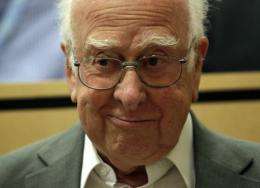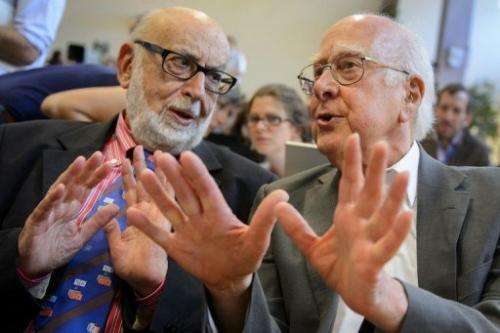Shy physicist whose name will live on in Higgs boson

Forty-eight years ago, British scientist Peter Higgs had a eureka moment when he realised there could be a particle that confers mass, one of the greatest puzzles in physics.
"He said: 'Oh shit, I know how to do that!'" former colleague Alan Walker told AFP of the breakthrough as recounted to him by Higgs, now 83, who today is hailed for widening our understanding of the Universe.
Higgs published a paper on his theory in 1964, becoming the flag bearer of a scientific premise to which several scientists had contributed over the years, but which, at the outset, found few backers.
Shy and unassuming, he lives quietly in the Scottish capital of Edinburgh, but was present in Geneva Wednesday when the European Organisation for Nuclear Research (CERN) said it had found a subatomic particle "consistent" with the long-sought boson that carries his name.
Higgs received a standing ovation as he arrived at the auditorium for the presentation wearing a grey suit and a white, open-collared shirt.
"It's an incredible thing that this has happened in my lifetime," the bald, ruddy-cheeked physicist said on his arrival, seemingly disconcerted by the media scrum that met him.
The elusive Higgs boson is believed to confer mass to some of the fundamental particles that make up matter.
Remembered for his high intelligence by people who worked with him, Higgs had his first paper on the boson rejected by the journal Physics Letters, edited at the time by the CERN, the same organisation which later embarked on a years-long, multi-billion-dollar quest to find it.
"He thought, well, they don't understand it," said Walker.
A second, more elaborate version of the paper was published by the journal Physical Review letters in the United States.
"He is a very mild mannered and very gentle man, but he actually does get a little tenacious if you say something wrong that (has to do with) physics," said Walker, a retired physicist who worked as a junior lecturer under Higgs.
Born in Newcastle upon Tyne, England, Higgs holds a PhD from King's College.

He also has several honorary degrees and has received numerous awards, including from the Royal Society, the Institute of Physics, the European Physical Society and the American Physical Society.
He has been mentioned as a possible Nobel contender.
A modest man, Higgs is said to have cringed every time the term "Higgs boson" was used in his presence and studiously avoided using it.
But as a self-proclaimed atheist, Higgs disliked the boson's other name, "God particle", even more.
"I think that actually would probably have provoked him into relenting and calling it the Higgs boson after all," said Walker, who travelled with Higgs to Geneva.
Higgs has shared some of his numerous awards with other physicists who contributed to the boson theory -- including the Belgian scientist Francois Englert, 79, who sat next to him at Wednesday's briefing with tears in his eyes as the announcement was made.
Posing a stark contrast to the more sedate Higgs, Englert appeared on a CERN video afterwards in a pink-striped shirt and bright blue tie, saying the discovery was "extremely important" as it showed the theory "is in place".
Robert Brout, Englert's colleague at Brussels' Free University, died last year at the age of 82.
The trio had shared the 2004 Wolf Prize, one of the top awards in physics.
Others credited with contributing to the Higgs theory include Americans Gerald Guralnik, 75, Carl Hagen, 75, and Briton Tom Kibble, 80, who jointly separate paper on the mechanism in the same year as Higgs.
American Nobel Prize winner Philip Anderson, 88, has reportedly claimed to have come up with the concept two years earlier.
(c) 2012 AFP




















